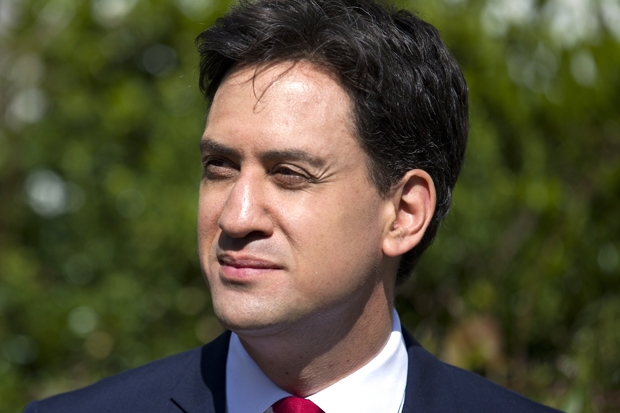As you’re reading this, I will still be recovering from the dinner I’m due to attend this week to celebrate the 40th anniversary of the Centre for Policy Studies, the think tank founded by Sir Keith Joseph and Margaret Thatcher. Earlier the same day, I’m due to appear on a panel with various conservative grandees to discuss whether the other side has won. Classical liberals emerged victorious from the battle of ideas in the 1980s, thanks in part to the work of the CPS, but it’s beginning to look as though we’ll have to have the same arguments all over again.
One reason for concern is the hard left turn taken by the Labour party. It has often been said that Thatcher’s greatest victory was converting her socialist opponents to economic liberalism. The arguments that she and others made in favour of free enterprise, deregulation and lower taxes were accepted by Tony Blair and — more grudgingly — by his successor.
The same cannot be said of Ed Miliband. As the date of the election draws near, it’s becoming clear that he rejects this consensus. He plans to resuscitate price controls, confiscate undeveloped land and impose a swingeing property tax. He’s even started to talk about renationalising the railways.
Miliband and his allies will cite the global financial crisis of 2007-08 as ‘evidence’ that markets need to be ‘reined in’ by the state. Yes, the British economy is on the mend, but the fact that millions of people had to make cutbacks during the recession will make them sympathetic to a left-wing critique of unbridled capitalism.
There’s also a good deal of scepticism about the benefits of the free enterprise system ‘trickling down’ to ordinary people. This is at the heart of Miliband’s ‘cost of living’ strategy, as well as his constant rhetoric about how ‘out of touch’ David Cameron and his ‘cabinet of millionaires’ are.
Intellectually, the left now has some quite big guns on its side, too, such as Joseph Stiglitz and Thomas Piketty. They’ve convinced the educated bourgeoisie that growing in-equality is an inevitable consequence of free market capitalism. They’re both eloquent exponents of the age-old case for redistributive taxation, namely, that you have to tax the rich to stop the poor from revolting.
What’s needed between now and the next election is a counter-offensive in which we wheel out some big guns of our own. I’m not just talking about Friedrich Hayek and Milton Friedman, who have the disadvantage of being dead, but some of the intellectuals who’ll be celebrating the 40th anniversary of the CPS, such as Dr Arthur B. Laffer, the economist who gave his name to the Laffer curve.
If we’re going to win this battle again, we will have to nail the canard that inequality has dramatically increased in the past 30 years. In Britain, the evidence suggests there may have been a small increase, but that’s largely due to government interventions in the market, such as giving tax breaks to pensioners, not a lack of state regulation. There’s also the rather awkward fact that Britain’s Gini coefficient has fallen since David Cameron came to power.
Globally, inequality has plummeted in the same period, thanks to the benefits of capitalism being extended to regions such as Africa, East Asia, Latin America and the Middle East. Earlier this year, the American Enterprise Institute produced a remarkable chart showing that between 1970 and 2006, the percentage of the world’s population living in poverty declined from 26.8 per cent to 5.4 per cent. That’s an 80 per cent reduction in world poverty in 36 years.
If charts and statistics don’t win people over, we can always point to François Hollande. Since the French equivalent of Ed Miliband became president, unemployment has soared and economic growth has ground to a halt. As for tax income, it has declined so steeply since Hollande increased the top rate to 75 per cent (thank you, Dr Laffer) that the French government is facing a €14 billion black hole in its public finances.
The success of the far right in France’s recent elections is a foretaste of what the effect of similar economic policies might be in Britain. If we’re to prevent a return to the dark days of the 1970s, when this country teetered on the brink of social collapse, we desperately need to restate the case for free market capitalism that was made so eloquently by Sir Keith Joseph and Margaret Thatcher 40 years ago.






Comments